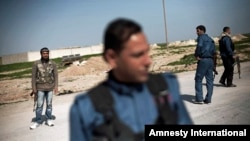ISTANBUL —
With Iraqi Kurds taking control of Kirkuk, it is likely that Ankara will have to rethink its policy towards the Kurds in the region. Until now, Ankara has warned them against taking control of the oil-rich city, which is seen as another step towards independence.
Iraqi Kurdish forces took control of Kirkuk following the collapse of the Iraqi army in the face of advances by the radical Islamist group, the Islamic State in Iraq and the Levant (ISIL).
Ankara has strongly opposed Iraqi Kurdish aspirations to take control of Kirkuk, arguing it belongs as much to the Iraqi Turkish minority.
But a clearer threat to Ankara, analysts say, is its close ties to the Kurdistan Regional Government, or KRG.
Last month, Turkey announced a 50-year energy deal between Ankara and the KRG.
The Kirkuk region is estimated to have reserves of 10 billion barrels of oil — more than enough to supply Turkey's needs.
International relations expert Soli Ozel of Istanbul’s Kadir Has University, says Ankara could be looking to Iraqi Kurds to bring order and secure its business deals in the face of increasing gains by ISIL forces.
"You have to choose between Iraqi or [ISIL] taking Kirkuk and I guess everybody would have preferred the Kurds take it. And obviously the Iraqi army is not a fighting force, and the only fighting forces against these gangs are the Kurdish troops, the Kurdish Peshmerga, and this strengthens their hand," said Ozel.
With ISIL having a large presence on Turkey’s Syria border, analysts say cooperation with Syrian Kurds also offers an opportunity to contain the Islamist group’s threat.
But that poses another challenge. Ankara is deeply hostile to the main Syrian Kurdish party, the PYD, which controls a region bordering Turkey because of its links with the Turkish Kurdish rebel group the PKK.
Political columnist Asli Aydintasbas of the Turkish newspaper Milliyet says any cooperation with Syrian Kurds will be difficult.
"The Syrian Kurdish issue is more complicated because the dominant group on the Kurdish side is an offshoot of the PKK called PYD. Turkey feels that improving relations with PYD will ultimately happen if they can work out a peace deal with the PKK," said Aydintasbas.
With ISIL destabilizing the region, threatening Ankara's business dealings and its border, political scientist Cengiz Aktar of the Istanbul Policy Center says Turkey may have to rethink its alleged ties with ISIL and other militant groups and work with the Syrian Kurds.
"Turkey might feel compelled to work with Syrian Kurds and stop harassing the Syrian Kurds against whom it employed ISIL and al-Nusra and all these al-Qaida offshoots, for months, if not years, as sub-contracting fighters," said Aktar.
News reports of the presence of ISIL fighters in Turkey’s border towns with Syria have been prevalent. But Ankara strongly denies it has given any support to ISIL.
Currently the peace process between Ankara and the PKK is stalled, but observers warn if ISIL continues to enjoy success, it will likely add to growing pressure on Ankara to rethink its policy towards Kurds across the region.
Iraqi Kurdish forces took control of Kirkuk following the collapse of the Iraqi army in the face of advances by the radical Islamist group, the Islamic State in Iraq and the Levant (ISIL).
Ankara has strongly opposed Iraqi Kurdish aspirations to take control of Kirkuk, arguing it belongs as much to the Iraqi Turkish minority.
But a clearer threat to Ankara, analysts say, is its close ties to the Kurdistan Regional Government, or KRG.
Last month, Turkey announced a 50-year energy deal between Ankara and the KRG.
The Kirkuk region is estimated to have reserves of 10 billion barrels of oil — more than enough to supply Turkey's needs.
International relations expert Soli Ozel of Istanbul’s Kadir Has University, says Ankara could be looking to Iraqi Kurds to bring order and secure its business deals in the face of increasing gains by ISIL forces.
"You have to choose between Iraqi or [ISIL] taking Kirkuk and I guess everybody would have preferred the Kurds take it. And obviously the Iraqi army is not a fighting force, and the only fighting forces against these gangs are the Kurdish troops, the Kurdish Peshmerga, and this strengthens their hand," said Ozel.
With ISIL having a large presence on Turkey’s Syria border, analysts say cooperation with Syrian Kurds also offers an opportunity to contain the Islamist group’s threat.
But that poses another challenge. Ankara is deeply hostile to the main Syrian Kurdish party, the PYD, which controls a region bordering Turkey because of its links with the Turkish Kurdish rebel group the PKK.
Political columnist Asli Aydintasbas of the Turkish newspaper Milliyet says any cooperation with Syrian Kurds will be difficult.
"The Syrian Kurdish issue is more complicated because the dominant group on the Kurdish side is an offshoot of the PKK called PYD. Turkey feels that improving relations with PYD will ultimately happen if they can work out a peace deal with the PKK," said Aydintasbas.
With ISIL destabilizing the region, threatening Ankara's business dealings and its border, political scientist Cengiz Aktar of the Istanbul Policy Center says Turkey may have to rethink its alleged ties with ISIL and other militant groups and work with the Syrian Kurds.
"Turkey might feel compelled to work with Syrian Kurds and stop harassing the Syrian Kurds against whom it employed ISIL and al-Nusra and all these al-Qaida offshoots, for months, if not years, as sub-contracting fighters," said Aktar.
News reports of the presence of ISIL fighters in Turkey’s border towns with Syria have been prevalent. But Ankara strongly denies it has given any support to ISIL.
Currently the peace process between Ankara and the PKK is stalled, but observers warn if ISIL continues to enjoy success, it will likely add to growing pressure on Ankara to rethink its policy towards Kurds across the region.




